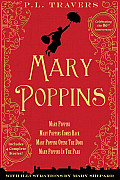
| Series: | Mary Poppins #1 |
| Illustrator: | Mary Shepard |
| Publisher: | Houghton Mifflin Harcourt |
| Copyright: | 1934 |
| Printing: | 2014 |
| ISBN: | 0-544-57475-3 |
| Format: | Kindle |
| Pages: | 202 |
This is an ebook, so metadata may be inaccurate or missing. See notes on ebooks for more information.
I read this book as part of Mary Poppins: 80th Anniversary Collection, which includes the first four books of the series.
I have a long-standing irritation with movies that become so famous that they swallow the book on which they were based, largely because of three examples from my childhood: Bambi (the book is so much better), The Wizard of Oz (the book is... not really better, but the rest of the series certainly is), and Mrs. Frisby and the Rats of NIMH (the book is so much more). That irritation is sometimes misplaced, however. Even Disney has been known to make a mediocre book into a better movie on occasion (The Hundred and One Dalmations). When Mary Poppins came up recently (a movie I adored as a kid), I vaguely remembered having read the book long ago, couldn't remember anything about it, and wondered what side of the fence it would come down on. Since an anniversary collection of the first four books was free with Amazon Prime, it was easy to find out.
Answer: perhaps the series improves in later books, but the movie is totally different in tone from the first book, and much better.
I am surprised that I'd forgotten as much about this book as I had, even though it's been at least thirty years since I've read it, since it is extremely odd. I suspect the highly episodic structure is to blame. Mary Poppins never develops into a proper story; instead, it's a series of vignettes about the titular character, the Banks family, and other people on Cherry-Tree Lane. Some of these stories will be familiar from the movie (Uncle Albert floating up into the air because of his laughter). Some will definitely not be, such as a (very brief) trip around the world via a magical compass, a visit from a star who is Christmas shopping, or a truly bizarre birthday celebration for Mary Poppins in the zoo. Unlike the movie, there is no unifying theme of Mary Poppins fixing the Banks's family problems; quite to the contrary, she seems entirely uninterested and even oblivious to them.
This is not Julie Andrews's kind, gentle, and magically competent nurse. There aren't two separate advertisements for her job; this Mary Poppins appears after Mrs. Banks sent letters to the papers advertising for a position and blithely dismisses her request for references. She is neither kind nor gentle, although by the end of the book one gets the feeling she's brought a sort of gruff stability to the household. Like the movie character, she does take the children on adventures, but they seem almost accidental, a side effect of being around Mary Poppins and thus inadvertantly involved in her business (which she rarely, if ever, explains). It's a more intimidating and fae strangeness, only slightly explained by a chapter that reveals that all children know how to talk to the sun and the wind and the animals but forget when they turn one, except for Mary Poppins. (Ode: Intimations of Immortality has a lot of depressing philosophy to answer for.)
Perhaps the oddest difference from the movie for me is that Travers's Mary Poppins is endlessly vain. She's constantly admiring herself in shop windows or finding just the right clothes, much to the frequent boredom of the children. It's an amusing take on a child's view of adult shopping trips, but the vanity and preening feels weirdly out of place for such a magical character.
There is no change in the Banks household in this book; perhaps there is more material in the later books. (The whole series appears to be eight volumes.) When the wind changes, Mary Poppins disappears as mysteriously as she appears, not even saying goodbye, although she does leave some gifts. By that point, Jane and Michael do seem fond of her, although I'm not entirely sure why. Yes, there are adventures, but outside of them, and even during them, Mary Poppins is short, abrupt, demanding, and fond of sharp and dismissive aphorisms. Gregory Maguire proclaims his preference for the books in the foreword on the grounds that they show more glimmers of mystery and danger, and I can see that if I squint. But I mostly found her unpleasant, dictatorial, irritating, and utterly unwilling to explain anything to curious children.
On this point, I'll dare to disagree with Maguire and prefer the Disney version.
A few of the stories here were fun and entertaining in ways not provided by the movie, particularly "Miss Lark's Andrew" (the successful escape of a neighbor dog from enforced isolation and unnatural pampering) and "Christmas Shopping" (I do hope the Pleiades liked their presents!). But when I get the urge for Mary Poppins, I think I'll turn to the movie with no regrets. This is an interesting curiosity, and perhaps subsequent books add more depth (and make Mary less obnoxious), but I don't think it's worth seeking out.
Followed by Mary Poppins Comes Back.
Reviewed: 2019-11-10